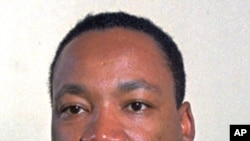Nearly a month after a hurricane postponed the dedication of a national memorial honoring civil rights leader Martin Luther King Jr., U.S. President Barack Obama leads the ceremony Sunday, Oct. 16.
King was the leading voice of the nation’s modern day civil rights movement, and this is the first major monument built on the National Mall to honor an African American.
Martin Luther King Jr. rose to prominence in the 1950s and 1960s as the young leader of a non-violent protest movement for racial equality. “The greatness of America is the right to protest for right,” he said.
King, a minister from Atlanta, Georgia, led hundreds of thousands of African Americans in a cause to end legalized racial segregation in the southern United States. The movement sparked violence at times, as white segregationists sought to enforce laws designed to keep the races separate - in places like restaurants, hotels, movie theaters, trains, buses and schools.
King began his rise to prominence in December 1955, spearheading a drive to desegregate public buses in Montgomery, Alabama.
“That was the day when we decided that we [African Americans] were not going to take segregated buses any longer,” King explained.
A year later, the U.S. Supreme Court ruled Alabama’s bus segregation law was unconstitutional. It was the first major civil rights victory for King and his movement.
“ Dr. King was a great man,” Reverend Calvin Woods recalls. Woods worked closely with King during a series of protests in Birmingham, Alabama. “He was a humble man who could talk with anyone," he said. "He would take the time to listen to anyone and seek to come out of the conversation with a genuine understanding.”
“I am happy to join with you today in what will go down in history as the greatest demonstration for freedom in the history of our nation,” King stated.
On August 28, 1963, more than a quarter of a million people converged on the nation’s capital for what's now known as the "March on Washington." King's most famous speech was the highlight of the historic protest for jobs and freedom.
“I have a dream that my four little children will one day live in a nation where they will not be judged by the color of their skin but by the content of their character,” King said.
Civil rights activist Barbara Arnwine says King's speech gave hope to so many. “He was saying to the nation, 'Reach high. You know, be aspirational in every regard when it comes to racial equality because only when we are a house united will we as a nation be strong,'” she said.
King’s dream for a better America began to take shape in 1964. At age 35 he became the youngest recipient of the Nobel Peace Prize. At the same time the civil rights movement succeeded in pressuring lawmakers and President Lyndon Johnson to approve (The 1964 Civil Rights Act and the 1965 Voting Rights Act) landmark legislation outlawing racial segregation in public places and discriminatory practices that prevented blacks from voting.
“I want to say to the people of America and the nations of the world we [African Americans] are on the move and no wave of racism can stop us,” King stated.
Not long after these achievements, though - in April1968 - King was assassinated in Memphis, Tennessee.
Related video report by Mariama Diallo
More than four decades after his assassination, the nation is honoring Martin Luther King and his vision of racial equality with a national memorial in Washington. The cornerstone of the memorial is the "Stone of Hope," a large granite sculpture which depicts King overlooking the memorials of former presidents on the shore of the Tidal Basin.
Harry Johnson is president of the foundation that has worked to build the $120 million King memorial. "When you come through here we want it to be surreal so you can actually see, ponder and think about what Dr. King would have done but moreover what Dr. King means today to all of us who never met him, and for the future," Johnson noted.
Vernon Roberts, a visitor from New Jersey, says the Martin Luther King memorial is unique. “It gives us [African Americans] a perspective other than the presidential memorials that you see in Washington, D.C. It affords us the opportunity to study, to know and actually to grow. And it's a form of encouragement to all of us,” he said.
Those who helped build the Martin Luther King national memorial say it is a lasting tribute to a man of peace, whose movement fought so hard for democracy, justice and improving the lives of millions of African Americans.
